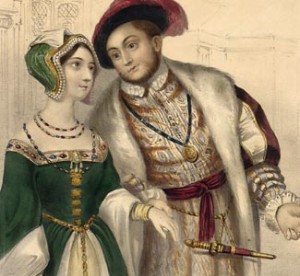 Early in the morning of 25th January 1533, the feast of the conversion of St Paul, King Henry VIII married Anne Boleyn in a secret ceremony performed by Rowland Lee, Henry VIII’s chaplain.
Early in the morning of 25th January 1533, the feast of the conversion of St Paul, King Henry VIII married Anne Boleyn in a secret ceremony performed by Rowland Lee, Henry VIII’s chaplain.
In attendance on the king and queen, according to Nicholas Harpsfield, the Catholic apologist writing in Mary I’s reign, were Henry Norris and Thomas Heneage, of the King’s Privy Chamber, and Anne Savage, Lady Berkeley.1 Eustace Chapuys, the imperial ambassador, reporting the marriage nearly a month after it had taken place, recorded that the couple were married “in the presence only of her father, mother, brother, and two intimate female friends of the Lady herself”.2
In his report of the marriage, Chapuys wrongly identified Thomas Cranmer, the man who would become Archbishop of Canterbury on 30th March 1533 and who would later announce the annulment of Henry VIII’s marriage to Catherine of Aragon, as the priest who performed the ceremony. There were obviously rumours flying around about this and Cranmer addresses these rumours in a letter to Nicholas Hawkins, Archdeacon of Ely, writing of how he didn’t even know about the marriage until two weeks after it had taken place:
“Notwithstanding it hath been reported throughout a great part of the realm that I married her; which was plainly false, for I myself knew not thereof a fortnight after it was done.”3
Henry VIII was of course still married to Catherine of Aragon at this point, but, according to Harpsfield, assured Rowland Lee that “he had gotten of the Pope a lycence to marry another wife”. When Lee asked to see the licence on the day of the marriage, the King said he had one “but it is reposed in another sure[r] place whereto no man resorteth but myself, which, if it were seen, should discharge us all.” Lee either had to take the King at his word or risk upsetting the King of England by challenging his word. I don’t think we can blame Lee for getting on with the ceremony!
Did Henry VIII commit bigamy by marrying Anne Boleyn while he was still married to Catherine of Aragon, after all, his first marriage hadn’t yet been annulled? The simple answer is “yes”, but Henry wouldn’t have seen it as bigamy. He had come to believe that his first marriage was invalid and that Pope Julius II had made a grave error trying to dispense of something that was against Biblical law. The Book of Leviticus stated:
“And if a man shall take his brother’s wife, it [is] an unclean thing: he hath uncovered his brother’s nakedness; they shall be childless.” (Leviticus 20: 21)
And Henry had married and slept with his brother’s widow. Although the Book of Deuteronomy seemed to contradict this – “If brethren dwell together, and one of them die, and have no child, the wife of the dead shall not marry without unto a stranger: her husband’s brother shall go in unto her, and take her to him to wife, and perform the duty of an husband’s brother unto her.” (Deuteronomy 25: 5) – canon law gave the laws of Leviticus precedence over those of Deuteronomy and Henry VIII saw his lack of a living male heir as proof that the marriage was wrong. As I have said in a previous article, while it is easy for us today to look at Henry’s justification for the annulment of his first marriage as a great excuse to get out of it and move on with Anne Boleyn, it is clear that he was genuinely troubled by the issue and had come to believe that the marriage was wrong in God’s eyes and that it should never have taken place. David Starkey writes of how, during the seven years of Henry’s quest for an annulment, the basic premise of Henry’s case did not change and he stuck to his argument, he was convinced.4
Chronicler Edward Hall gives an earlier date for a secret marriage between Henry VIII and Anne Boleyn:
“The kyng, after his returne [from Calais] maried priuily[privily] the lady Anne Bulleyn on sainet Erkenwaldes daie, whiche mariage was kept so secrete, that very fewe knewe it, til she was greate with child, at Easter after.”5
The Feast of St Erkenwald was celebrated on 14th November and this was the day in 1532 on which Henry VIII and Anne Boleyn had landed at Dover following their visit to Calais to meet with Francis I and gain his support for their marriage plans. Hall may be the only contemporary source for this earlier wedding date, but Anne and Henry did begin co-habiting after their visit to Calais and Anne appears to have been pregnant with Elizabeth before their secret marriage ceremony on 25th January 1533. It makes sense to me that the couple entered into some kind of betrothal or marriage at this point and then consummated it, the January ceremony rubber-stamping this earlier promise. We’ll never know for sure though, but it does explain why they suddenly started sleeping together and risking pregnancy after so long.
Notes and Sources
- Harpsfield, Nicholas (1878) A Treatise on the Pretended Divorce between Henry VIII and Catharine of Aragon, Camden Society, p.234-235.
- Calendar of State Papers, Spain, Volume 4 Part 2, 1531-1533, 1053.
- ed. Cox, Rev. John Edmund (1844) Miscellaneous writings and letters of Thomas Cranmer, The University Press, Cambridge, p.246.
- Starkey, David (2003) Six Wives: The Queens of Henry VIII, Harper Perennial, p.204.
- Hall, Edward (1809) Hall’s Chronicle, printed for J. Johnson; F.C. and J. Rivington; T. Payne; Wilkie and Robinson; Longman, Hurst, Rees and Orme; Cadell and Davies; and J. Mawman; London. p.794.